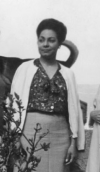Sara Perelló was a pediatrician living in Havana in the heat of the Cuban Revolution. Born in 1920, she not only worked in the capital but also studied there, graduating in 1953. Ten years later, Fidel Castro would call on Cuban doctors to assist in a medical mission to Algeria. Algerians had won their independence against French forces; however, independence caused French doctors to leave in droves, leaving the newly decolonized country medically vulnerable. Perelló joined the medical mission to Algeria, experiencing logistical issues and discrimination. Nevertheless, her experiences in Algeria ingrained her as a humanitarian and as a trailblazer for Cuban medical internationalism. Her perspective as a working woman in a new land must be analyzed through a lens of intersectionality, due to her contributions to the effort of medical missions in the Global South.

Both gender and class intersect Perelló’s life, especially during her time in Algeria. There she experienced inconsistent pay and misogyny, the latter her colleagues recognized was more intense than biases in Cuba. Despite the Cuban government’s attempts to use the rhetoric of gender equality, many times these initiatives fell short. Even the framing of gender was biased, as Cuba generally centers men by describing aspects of society as machismo, rarely even using the word feminism. Perelló herself was a pediatrician, indicative of many women who chose that path to avoid discrimination against women doctors, an aspect of the job amplified in Algerian society. The fact that volunteer work was arduous and gave little pay intersect the roles that class and gender played in Perelló’s experiences. During her time abroad, she dealt with both a poor Cuban government that still stayed within the confines of a patriarchal society and an Algerian people that, though not entirely, still harbored similar sentiments.
Regardless, Perelló persevered. In Cuba, she represents someone who rose to the cause of medical internationalism, playing a key role that would pave the way for additional efforts in African nations like Guinea-Bissau. Even at eighty-four years old, she still was working by educating in Havana. Sara Perelló’s actions exemplify the resilience of Cubans during a period of revolutionary upheaval against the forces of neocolonialism that still permeated in both Latin America and Africa. Cubans like Perelló redefined revolution in Latin America as not just a domestic but international movement for Global South solidarity against U.S. hegemony.
Works Cited
Gleijeses, Piero. Conflicting Missions: Havana, Washington, and Africa, 1959-1976. Chapel Hill and London: The University of North Carolina Press, 2002.
Pérez, José O. and Silva, André L. Reis. “Cuban Medical Internationalism through a Feminist Perspective.” Contexto Internacional 41, no. 1 (2019): 65-88.
BROUWER, STEVE. “Creating Two, Three … One Hundred Thousand Che Guevaras.” In Revolutionary Doctors: How Venezuela and Cuba Are Changing the Worlds Conception of Health Care, 41–54. NYU Press, 2011. Accessed in JSTOR.
